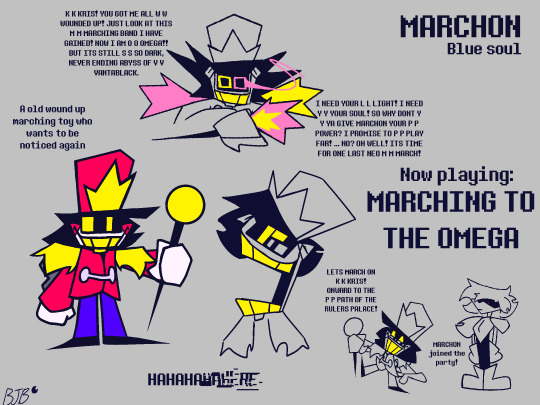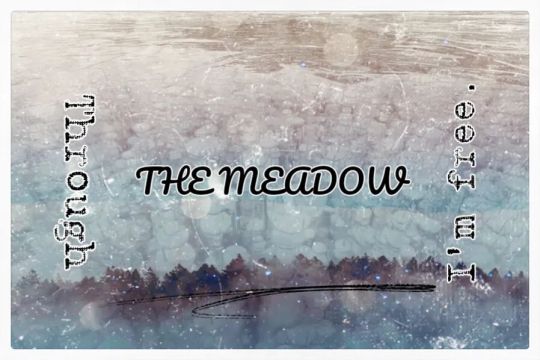#marchons
Text
So I've found there's some other secret bosses who share traits with mine, and by that I mean I was well aware of that when it comes to Bitsy and Elymas when I made them, but didn't expect it as much with Veratus.
So I decided to draw my bosses with other people's bosses! Starting with Veratus! (Ironic as he's the last of my secret bosses I made for a Deltarune prediction. Any others I make will be for Fool's Fate.)

First we've got Veratus with @glitch-the-artist's toy solider with blue soul mode secret boss, Marchon. They and Veratus can bond over... wind up keys I guess? Veratus does have a wind up key on his back that just isn't often shown unless he's facing backwards. It starts winding the other direction whenever he... steps out of line, to speak. (Fun fact, Veratus also has a rattail braid that can be see from his back too. Get it? Because, because he's a rat and-)

Next is Veratus with @mercair's Quiddo, who might not seem in anyway related to Veratus, however both of them originate from Dark World's that aren't the one's they're found in, and get overtaken by plants or fungi.
Anyways, hope you two enjoy and who should I draw my bosses with next? I know there's like, loads of abandoned cartoon Chapter 3 bosses, same with fallen angel Chapter 4 bosses so it's hard to narrow down who to draw Bitsy and Elymas with.
#deltarune#deltarune secret boss#secret boss#veratus#quiddo#marchon#deltarune fan character#mercair#glitch-the-artist
33 notes
·
View notes
Text

hi, have this secret boss prediction.
made it for fun, lol.
47 notes
·
View notes
Photo

Cementorr - Road Bots (Marchon)
45 notes
·
View notes
Text
French anthem absolutely fucks.
#imagine we got that every weekend instead of netherlands and austria#machONS. MARCHONS#it just works!!!!
3 notes
·
View notes
Text

Last session was a lot of combat and a lot of fun. Level 9 characters getting to cut loose!
Ft Swoops' bigger form, a horribly slimy demon that looks a lot like a young remorhaz.
#DnD#D&D#bad decisions club#sketches#art#Swoops#charlotte#clarion#meepo#calcryx#Pyre#Hyacinth Marchon#werewolves#injuries#flames#fire#insect#remorhaz
1 note
·
View note
Text

@marchon asked: ❝ like you said, i like to wander around. ❞

mary was not one to be easily spooked. she was a fairly big horror fan, she’d had her share of close calls and adventures, still there was some sense of unease she had felt the moment she stepped into the hotel cortez she couldn’t shake. the best place to squash that lingering feeling was of course the hotel bar.
she wasn’t sure what direction the stranger who joined her came from, he seemed to have just appeared in thin air, but she tried not to think too hard about the whole deal. instead she nodded ❝ i see. i suppose all that wandering has made you pretty familiar with the lay out of this place. i’m surprised i made it back out here, i got lost trying to find my room. ❞ she laughed and took a sip of her drink. ❝ i swear this place is built like a maze. ❞
0 notes
Photo

When was the last time you've allowed yourself to be so vulnerable? Let someone touch your soul? Was free because of it? It's exhilarating! I hope to reach you somewhere in the middle. Immerse yourself within the adventure, romance and suspense. You won't regret it. #Vulnerable #OutThere #InTheOpen #NewBritain #WritingCommunity #Bookstagram #NoRegrets #MarchOn #Author #Amazon #SelfPublished #Wrapped #InTheRays #OfTheSun #Queen #Battle #CivilWar #HowCouldYou #MissOut https://www.instagram.com/p/Cdfte-xO0ut/?igshid=NGJjMDIxMWI=
#vulnerable#outthere#intheopen#newbritain#writingcommunity#bookstagram#noregrets#marchon#author#amazon#selfpublished#wrapped#intherays#ofthesun#queen#battle#civilwar#howcouldyou#missout
0 notes
Text
#DIMANCHE 8 MAI A 10 H#MARCHONS DE PORTE DES POSTES AU CIMETIERE D’HAUBOURDINPOUR RENDRE HOMMAGE AUX « TIRAILLEURS » AFRICAINS#L'itinéraire du cortège est le suivant : Porte des Postes à l'angle du boulevard de Metz (rassemblement)#boulevard de Metz#avenue Beethoven#rue du Faubourg de Béthune#rue du Maréchal Foch (LOOS)#rue George Potié#rue Auguste Potié (HAUBOURDIN)#rue Léon Gambetta#rue du#Général Dame#Cimetière militaire d'Haubourdin (fin).#Macron le libéral a fait de l’étranger#de l’immigré#du réfugié#de l’exilé#du sans papiers les bouc-émissaires des maux économiques et sociaux du pays.#Macron a fait des sans domicile fixe#des sans emplois les « responsables » de leur galère et misère.#Macron a éborgné#mutilé les Gilets Jaunes et des salariés ou syndicalistes pour avoir résisté à la hausse des prix ou aux licenciements et en a traîné devan#Macron a fait des lois et des politiques négrophobes#arabophobes#islamophobes#rromophobes#etc.#Macron par le Racisme d’État a ainsi fait le lit du fascisme lepéniste et zemouriste qui représentent l’État Raciste.#Nous Sans Papiers#sommes fâché(e)s :
1 note
·
View note
Photo

Slasher - M-Force (Marchon)
34 notes
·
View notes
Text
Les temps du présent
Le présent de l'indicatif/présent simple
The indicative present is used to
describe what one is currently doing (présent d'énonciation): je travaille - I'm working (as we speak)
describe a fact (présent de vérité générale/historique): les chats sont des animaux - cats are animals
describe an ongoing fact that started in the past (présent duratif): il pleut depuis hier - It's been raining since yesterday
describe the scene (présent de description): le soleil est caché aujourd'hui - the sun is hiding today
describe a habit (présent d'habitude): je cours tous les dimanches - I run every sunday
describe what just happened (présent de passé proche): je viens d'arriver - I just got there
describe what is about to happen (présent de futur proche): je suis là dans une minute - I'll be there in a minute
give an order (présent d'injonction), alternative to the imperative present: tu rentres tout de suite ! - You get home immediately!
make a story feel real (présent de narration): il y a six ans déjà que mon ami s'en est allé avec son mouton. Si j'essaie ici de le décrire, c'est afin de ne pas l'oublier. - It has been six years since my friend left with his sheep. If I try to describe him here, it is so that I will not forget him. (Le Petit Prince)
express a possibility (présent d'hypothèse): si tu es gentil, tu auras un cadeau - if you're kind, you'll get a present
La conjugaison
First group (-er except Aller): je marche, tu marches, il/elle/on marche, nous marchons, vous marchez, ils/elles marchent
Second group (-ir with -iss- in the plural forms): je finis, tu finis, il/elle/on finit, nous finissons, vous finissez, ils/elles finissent
Third group (everything else): typically je cours, tu cours, il court, nous courons, vous courez, ils courent; long -oir verbs: je veux, tu veux, il veut, nous voulons, vous voulez, ils veulent; -indre/-soudre verbs: -s, -s, -t, -ons, -ez, -ent; other -dre verbs: -ds, -ds, -d, -dons, -dez, -dent; -ttre: -ts, -ts, -t, -tons, -tez, -tent; -rir, -llir: -e, -es, -e, -ons, -ez, -ent
Auxiliaries: je suis, tu es, il est, nous sommes, vous êtes, ils sont + j'ai, tu as, il a, nous avons, vous avez, ils ont
N.B. Many third-group verbs are irregular because they used to be two different verbs (ex: Être comes from both Essere - to be and Stare - to stand) that eventually became one and consequently have two bases and can have up to five stems. Always double-check for different, stems, extra letters, accents, etc.
Notable exceptions:
A vowel -i- cannot be between two other vowels in the first and second person plural so it will turn into -y- (vous croyez, nous voyons)
In -cer and -ger verbs, the first person plural changes to allow for the correct pronunciation (nous lançons, nous mangeons); c > ç, go > geo.
In -aître verbs, only the third person singular keeps the accent (elle naît).

Le présent progressif
The progressive present is an emphasized version of the enunciation present and is therefore used to describe an ongoing action that started recently and is actively being done as the narrator is speaking.
It is built by putting together the subject, the verb Être conjugated in the indicative present tense, the adverbial locution "en train de" (in the progress of), the infinitive form of the verb of action, and possibly an object.
Je suis en train de manger, j'ai bientôt fini - I'm eating, I'm almost done
Est-ce que tu es en train de travailler? - are you working?
Nous sommes en train de faire nos devoirs - we are doing homework
Le conditionnel présent
The present conditional is used
to express a wish: j'aimerais retourner en Italie - I'd love to go back to Italy
a suggestion: tu devrais partir tôt - you should leave early
a hypothesis: il pourrait rentrer demain - he could come home tomorrow
to casually share one's opinion: je n'aimerais pas qu'on me dise ça ! - I wouldn't like it if someone told me that (can be a way to aggravate a situation)
to ask something politely: je voudrais un café - I'd like a coffee
to refer to the future in the past: elle a dit qu'elle arriverait tard - she said she'd arrive late
La conjugaison
Conjugating the present conditional is easy for the first two verbal groups: just add the terminations to the infinitive of the verb. If the verb ends in -e, remove it: prendre > je prendrais. Fun fact: you can build the imperfect tense by removing -er- for the first group and turning -ir- into -iss- for the second.
First group (-er except Aller): je marcherais, tu marcherais, il marcherait, nous marcherions, vous marcheriez, ils marcheraient
Second group (-ir with -iss- in the plural forms): je finirais, tu finirais, il finirait, nous finirions, vous finiriez, ils finiraient
Third group (everything else): typically: je courrais, tu courrais, il courrait, nous courrions, vous courriez, ils courraient; auxiliaries: je serais, tu serais, il serait, nous serions, vous seriez, ils seraient + j'aurais, tu aurais, il aurait, nous aurions, vous auriez, ils auraient
Main irregular verbs: auxiliaries + aller - j'irais, devoir - je devrais, pouvoir - je pourrais, recevoir - je recevrais, savoir - je saurais, tenir - je tiendrais, venir - je viendrais, voir - je verrais, vouloir - je voudrais
N.B. Make sure to not mix it up with the simple future tense, they're similar!

L'impératif présent
The present imperative mood can only be conjugated in the second person singular and the first and second person plural. It is used
to give an order: viens ici tout de suite - come here right now
a suggestion: appelle-le tout de suite, non ? - maybe call him now?
a plea: s'il te plaît, pardonne-moi ! - please, forgive me
to ban someone from doing something: ne touche pas à ça ! - do not touch that
La conjugaison
Warning: it often looks like the indicative present - without a subject. If so, in the second person singular, the verb will require a final -s only if the current final letter is a consonant. Certain verbs cannot be conjugated, like vouloir.
être: sois, soyons, soyez; avoir: aie, ayons, ayez
va, allons, allez; finis, finissons, finissez; marche, marchons, marchez
N.B. Pronouns can be added: a reflexive verb will come with a tonic pronoun and a dash in a positive sentence: Lave-toi !, and a direct object pronoun in a negative sentence: Ne te vexe pas !; when referring to a portion -en: Prends-en un peu ! (an -s will be added for the liaison to be possible), and to a place, -y: Vas-y !
L'infinitif présent
is the neutral form you find in dictionaries: courir, marcher, prendre
is found after prepositions À, De, Pour and Sans: c’est sans dire, viens à la maison pour dîner !, on part sans perdre de temps
is found after a conjugated verb: il voulait partir tôt (the second verb can be the first element of the sentence: courir nous fatigue)
expresses an order, advice, prohibition: frapper avant d’entrer
expresses anger, surprise or a wish: m'excuser, moi ? plutôt mourir !
expresses doubt in an interrogative sentence: que faire de ce garçon ?
Le participe présent
The present participle works like an adverb and either expresses an action that happens at the same time as another action, that is possibly the consequence of that action, or describes the subject. It is built by removing the termination of the verb and replacing it by -ant.
Les employés possédant une voiture peuvent se garer dans la rue - the employees who own a car can park in the street
Étant déjà en retard, je décide de courir - being already late, I decide to run
N.B. To get the right pronunciation or avoid a mix-up with an adjective, it can be necessary to modify or add letters when building the present participle. For example: convaincre > convainquant (as convaincant is the adjective), diverger > divergeant ([ʒ], as divergant would be a [g] sound).

Movie: La Piscine - Jacques Deray, 1969
168 notes
·
View notes
Text
Fin de journée... marchons vers un week-end bonheur... Bonne soirée chers amis
30 notes
·
View notes
Text



VERY RARE Vintage 1987 Marchon Star Prancer Sunglow Horse Fantasy Fillies ebay JessiL02 Clothing and More
9 notes
·
View notes
Text
✎ le présent
-er verbs
je - e
tu - es
il/elle/on - e
nous - ons
vous - ez
ils/elles - ent
~par exemple : marcher
je marche
tu marches
il marche
nous marchons
vous marchez
ils marchent
-ir verbs
je - is
tu - is
il/elle/on - it
nous - issons
vous - issez
ils/elles - issent
~par exemple : finir
je finis
tu finis
il finit
nous finissons
vous finissez
ils finissent
-re verbs
je - s
tu - s
il/elle/on - 🚫
nous - ons
vous - ez
ils/elles - ent
~par exemple : attendre
j’attends
tu attends
il attend
nous attendons
vous attendez
ils attendent
#self study#french#french langblr#french language#french learning#frenchblr#langblr#language learning#french vocab#foreign languages#study french
56 notes
·
View notes
